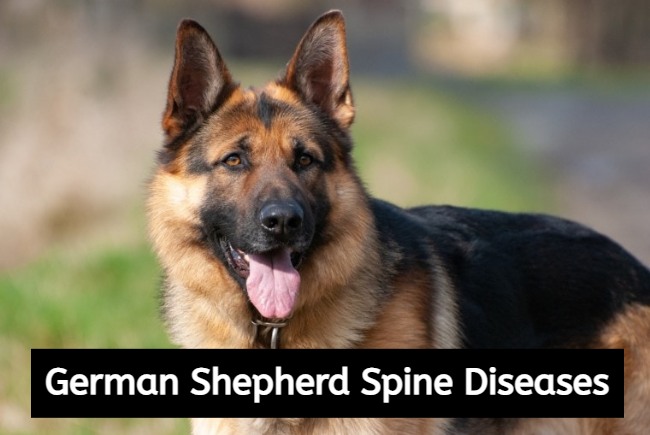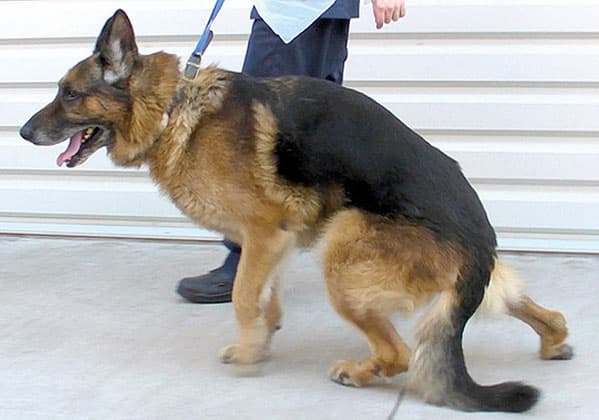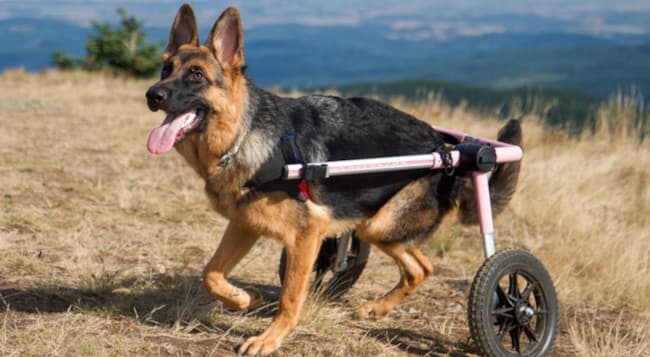German Shepherds are one of the most popular breeds of dogs in the world. As with all breeds of dogs, German Shepherds are prone to certain health problems. One such problem is German Shepherd spine disease.

If you are a parent of a German Shepherd, it is important to be aware of the signs and symptoms that could indicate a spinal issue. In this article, we will discuss the causes, symptoms, and treatment of German Shepherd spine disease.
German Shepherd Spine Diseases
The most common German Shepherd spine problems are Degenerative Myelopathy and IVDD (Intervertebral Disc Disease). Degenerative Myelopathy is a progressive disease that affects the spinal cord. Symptoms of this condition include lameness, weakness in the hind limbs, and incontinence.
IVDD is a disc-related issue that can cause pain and paralysis if not treated quickly. This condition involves the discs between the vertebrae becoming worn or even ruptured, which can cause compression of the spinal cord. Symptoms of IVDD include pain, incoordination, and paralysis. Let’s know about German Shepherd spine diseases. Also, know the German Shepherd neutering behavior here.
Degenerative Myelopathy
Degenerative Myelopathy is a progressive condition, meaning it will worsen over time. It is caused by degeneration of the nerves in the spinal cord, resulting in paralysis of the hind limbs. As the disease progresses, mobility and coordination become worse, and eventually, in severe cases, incontinence can occur.

Symptoms
The symptoms of Degenerative Myelopathy include:
- Lameness in the hind legs
- Weakness in the hind legs
- Incoordination or staggering
- Muscle atrophy
- Paralysis of the hind limbs
Diagnosis and Treatment
If you suspect your German Shepherd has Degenerative Myelopathy, it is important to take them to a veterinarian for proper diagnosis and treatment. Your vet will perform a physical exam, take blood tests, and may recommend X-rays or MRI scans.
Depending on the severity of the condition, treatment options can range from medications to physical therapy and even surgery in some cases. Medications such as anti-inflammatory drugs and steroids can be used to reduce pain and inflammation, while physical therapy can help with improving muscle strength and coordination. In severe cases, surgery may be necessary to remove any damaged discs or bones that are compressing the spinal cord.
It is important to note that Degenerative Myelopathy cannot be cured; however, early diagnosis and treatment can help slow the progression of the disease and improve your dog’s quality of life. Also, see this guide to know about fungal german shepherd skin yeast infection.
Intervertebral Disc Disease
Intervertebral Disc Disease, or IVDD, is a disc-related issue that can cause pain and paralysis if not treated quickly. This condition involves the discs between the vertebrae becoming worn or even ruptured, which can cause compression of the spinal cord. This is another dangerous German Shepherd spine disease.

Symptoms
The symptoms of this German Shepherd spine disease IVDD include:
- Pain
- Weakness in the hind legs
- Incoordination or stumbling
- Loss of feeling or sensation in the affected area
- Paralysis of the hind limbs
Diagnosis and Treatment
If you suspect your German Shepherd has IVDD, it is important to take them to a veterinarian for proper diagnosis and treatment. Your vet will perform a physical exam, take X-rays or MRI scans, and may recommend further tests such as an electromyogram (EMG) or computed tomography (CT) scan.
Treatment options for IVDD depend on the severity of the condition. In mild cases, conservative treatment such as rest and medications to reduce inflammation may be recommended. Surgery is an option for more severe cases, where a portion of the disc must be removed in order to relieve pressure on the spinal cord.
It is important to note that IVDD can cause permanent damage if not treated promptly. Early diagnosis and treatment can help prevent long-term complications and improve your dog’s quality of life.
Conclusion
Overall, it is important to be aware of the common German Shepherd spine diseases that can develop in order to provide them with the best care possible. If you notice any signs or symptoms of Degenerative Myelopathy or IVDD in your dog, we recommend seeking veterinary care immediately. Hope this was helpful. Thank you for reading! Visit the GermanShepherdss site for more information.

